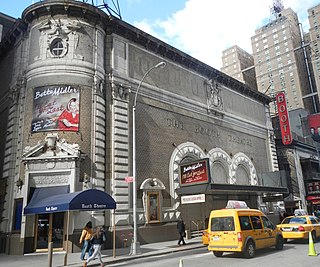
Five Star Final is a 1931 American pre-Code film about crime and the excesses of tabloid journalism. The picture was written by Robert Lord and Byron Morgan from the play of the same name by Louis Weitzenkorn, directed by Mervyn LeRoy, starring Edward G. Robinson, and featuring H. B. Warner, Marian Marsh, Oscar Apfel, Aline MacMahon, Frances Starr, Ona Munson, and Boris Karloff.

The Shop Around the Corner is a 1940 American romantic comedy film produced and directed by Ernst Lubitsch and starring Margaret Sullavan, James Stewart and Frank Morgan. The screenplay was written by Samson Raphaelson based on the 1937 Hungarian play Parfumerie by Miklós László. Eschewing regional politics in the years leading up to World War II, the film is about two employees at a leathergoods shop in Budapest who can barely stand each other, not realizing they are falling in love as anonymous correspondents through their letters.
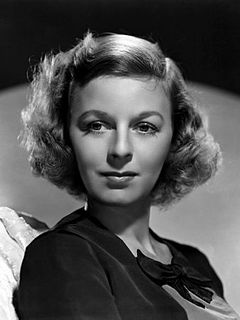
Margaret Brooke Sullavan was an American actress of stage and film.

Leland Hayward was a Hollywood and Broadway agent and theatrical producer. He produced the original Broadway stage productions of Rodgers and Hammerstein's South Pacific and The Sound of Music.

The Mortal Storm is a 1940 drama film from MGM directed by Frank Borzage and starring Margaret Sullavan and James Stewart. The film's theme is the impact upon a nation's population when the country becomes fascist. The supporting cast features Robert Young, Robert Stack, Frank Morgan, Dan Dailey, Ward Bond and Maria Ouspenskaya.
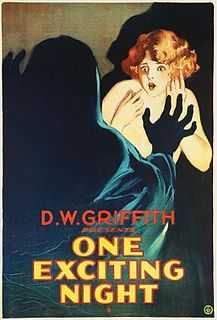
One Exciting Night is a 1922 American Gothic silent Mystery film directed by D. W. Griffith.

I Live My Life is a 1935 American comedy-drama film starring Joan Crawford, Brian Aherne, and Frank Morgan, and is based on the story "Claustrophobia" by A. Carter Goodloe.

The Shining Hour is a 1938 American romantic drama film directed by Frank Borzage, based on the 1934 play The Shining Hour by Keith Winter, and starring Joan Crawford and Margaret Sullavan. The supporting cast of the MGM film features Robert Young, Melvyn Douglas, Fay Bainter and Hattie McDaniel.
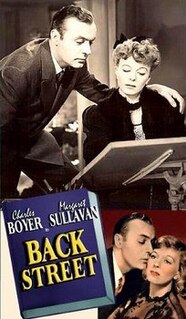
Back Street is a 1941 American drama film directed by Robert Stevenson and starring Charles Boyer and Margaret Sullavan. It is a remake of the 1932 film of the same name, also from Universal. The film is adapted from the 1931 Fannie Hurst novel and the 1932 film version which it follows very closely, in some cases recalling the earlier film scene-for-scene. It is a sympathetic tale of an adulterous couple.
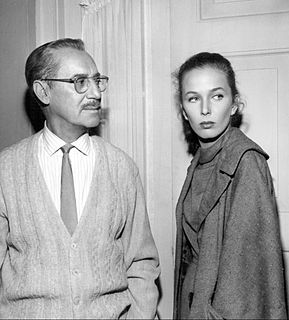
Brooke Hayward is an American stage, film and television actress. She is the author of Haywire, a best-selling memoir about her family.
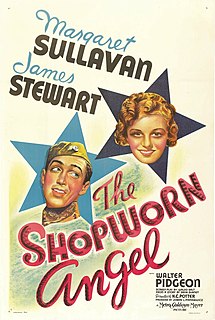
The Shopworn Angel is a 1938 American drama film directed by H. C. Potter and starring James Stewart, Margaret Sullavan, and Walter Pidgeon. The MGM release featured the second screen pairing of Margaret Sullavan and James Stewart following their successful teaming in the Universal Pictures production Next Time We Love two years earlier.
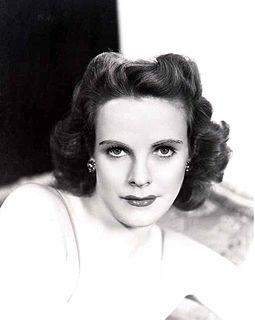
Claudia Louise Morgan was an American film, television and radio actress. She was best known for debuting the role of Vera Claythorne in the first Broadway production of Agatha Christie's Ten Little Indians and for her portrayal of Nora Charles on the 1940s radio series, The Adventures of the Thin Man.

Strictly Dishonorable is a 1931 pre-Code romantic comedy film directed by John M. Stahl and starring Paul Lukas, Sidney Fox and Lewis Stone, George Meeker, and Sidney Toler. It was written by Gladys Lehman and based on Preston Sturges' 1929 hit Broadway play of the same name. Strictly Dishonorable was Sturges' second play on Broadway, and his first to be filmed for the silver screen.

The Good Fairy is a 1935 romantic comedy film written by Preston Sturges, based on the 1930 play A jó tündér by Ferenc Molnár as translated and adapted by Jane Hinton, which was produced on Broadway in 1931. The film was directed by William Wyler and stars Margaret Sullavan, Herbert Marshall, Frank Morgan and Reginald Owen.

Next Time We Love is a 1936 melodrama film directed by Edward H. Griffith and starring Margaret Sullavan, James Stewart and Ray Milland. The adapted screenplay was by Melville Baker, with an uncredited Preston Sturges and Doris Anderson, based on Ursula Parrott's 1935 novel Next Time We Live, which was serialized before publication as Say Goodbye Again. The film is also known as Next Time We Live in the U.K.

Aline Laveen MacMahon was an American actress. Her career began on stage in 1921. She worked extensively in film and television until her retirement in 1975. She was nominated for an Academy Award for Best Supporting Actress for her performance in Dragon Seed (1944).
Heat Lightning is a 1934 Pre-Code drama film starring Aline MacMahon, Ann Dvorak, and Preston Foster. It is based on the play of the same name by Leon Abrams and George Abbott.

Haywire (ISBN 978-0-307-73959-9) is the 1977 memoir by actress and writer Brooke Hayward, daughter of theatrical agent and producer Leland Hayward and actress Margaret Sullavan. It is a #1 New York Times Best Seller and was on the list for 17 weeks. In Haywire, Brooke details her experience of growing up immersed in the glamorous and extravagant lifestyle afforded by her parents’ successful Hollywood and Broadway careers and tells the story of how her very privileged, beautiful family and their seemingly idyllic life fell apart.

Broadway Musketeers is a 1938 American musical drama film directed by John Farrow for Warner Bros. Starring Margaret Lindsay, Ann Sheridan and Marie Wilson as three women who grew up in an orphanage and cross paths later in life, it is a remake of the earlier Warners film, Three on a Match.
